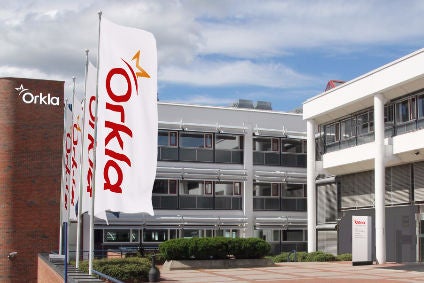
Orkla has suggested it will increase prices due to “significantly” weak Nordic currencies, which have pushed up input costs as the coronavirus crisis spurs demand for safety in the euro and US dollar.
Jaan Ivar Semlitsch, the chief executive of acquisition-hungry Orkla, pinpointed the Swedish and Norwegian kronas as the main culprits as he discussed the impact of Covid-19 on its first-quarter results with analysts yesterday (5 May).

Discover B2B Marketing That Performs
Combine business intelligence and editorial excellence to reach engaged professionals across 36 leading media platforms.
Oslo-listed Orkla reported a more than 5% rise in sales on organic basis, as consumer stockpiling boosted its performance in retail during the quarter.
However, the foodservice business, which accounts for 25% of group sales, was “significantly down” as more people ate at home and as food outlets closed temporarily under government orders to curb the spread of Covid-19 – what Ivar Semlitsch described as “considerable disruption” to the out-of-home sector.
As well as the impact of weak currencies on the supply of base products, the CEO also suggested other factors, such as access to foreign workers, could also inflate costs going forward.
“On the supply side, we see many external factors like closed borders and less migrational seasonal workers, and this can effect both availability and prices of raw materials. So far this has been manageable,” Ivar Semlitsch told analysts.

US Tariffs are shifting - will you react or anticipate?
Don’t let policy changes catch you off guard. Stay proactive with real-time data and expert analysis.
By GlobalDataHe continued with respect to the currency impact: “FX is an important factor when you talk about our input costs. We source a considerable amount of raw materials in foreign currencies, particularly in euros and to some extent US dollars. The significant weakening of the Norwegian krona will require pricing actions going forward.”
Orkla’s portfolio consists of bakery, cereals, spices, meals, snacks and pizza, predominately centred on local brands in Norway, Sweden, Denmark, and Finland, leaving the company susceptible to swings in those currencies.
And weakness in the Swedish krona added NOK1.1bn (US$107.2m) to Orkla’s debt in the first quarter, according to finance chief Harald Ullevoldsæter.
Group organic growth quickened to 5.4% in the three months to 31 March, from 1.3% a year earlier, led by a 10.8% rise in Orkla’s food business and 2.1% in confectionery and snacks.
However, while confectionery and snacks saw higher growth from business with Nordic retail customers, it was offset by reduced listings with a “large customer” in Denmark, and a “demand shortfall in the Baltics”, the CEO said, adding that stock piling was absent in the sector.
Ivar Semlitsch also talked about the implications of Covid-19 on its performance in April, given the virus only started to have an impact in the final month of the first quarter.
“We believe [stockpiling] was effectively over in March and there is a risk for some reversal of consumer stocks ahead,” the CEO said. “At the same time, we expect a continued positive impact on demand for food and care products as consumers spend more time and money at home compared to pre-coronavirus times.
“Out-of-home consumption continues at a significantly lower level. Even though about 25% of our sales goes to the out-of-home segments, Q1 only had a few weeks of impact.
“We do expect out-of-home activity to gradually pick up once containment measures are lifted. But until this happens, we are likely to continue seeing very low activity levels in this part of the business.”
Looking at the financials, first-quarter group revenues rose 15% to NOK11.5bn, while EBIT climbed 9% to NOK978m. Net profit increased 23% to to NOK932m.
Unlike many packaged food companies, Orkla has opted to maintain its annual guidance rather than pulling it amid the uncertainties from Covid-19, but Ivar Semlitsch said he would not be offering any predictions on the nearer-term outlook, as has been policy in the past.
In its 2019 annual report, Orkla said it would target “long-term organic growth at least in line with market growth”. And the short-term market growth is “expected to be aligned with the 2019 level”, which was 1.4%.
Nevertheless, the CEO did provide some thoughts on how he sees markets panning out.
“I want to be cautious in concluding any long-term implications on consumer preferences and behaviour,” Ivar Semlitsch said. “The level of uncertainty remains high. The level of disruption caused by the length and severity of the pandemic, and the length and scope of restricted measures is very difficult to judge.
“This is an unprecedented situation, throughout ourselves and society. But I am very confident that Orkla’s sustainable business model is well positioned to remain strong in the medium to long term.”
But the CEO also threw in another uncertainty – a pending global recession – making “cash discipline” a key requisite, which in turn will see the postponement of “non-critical investments”, he said.
Ivar Semlitsch added: “We expect to see changes in consumer behaviour. As the financial crisis and high levels of unemployment evolve, that will undoubtedly impact consumption patterns and purchasing power across markets. Personally, I believe it will take a while before society opens up again. [But] I believe our diversified market structure serves us well. We have strong long-term fundamentals.”





